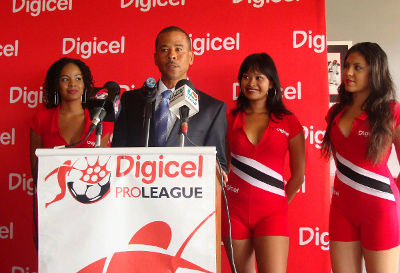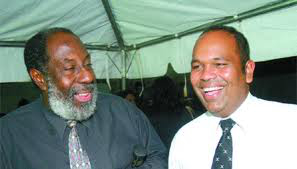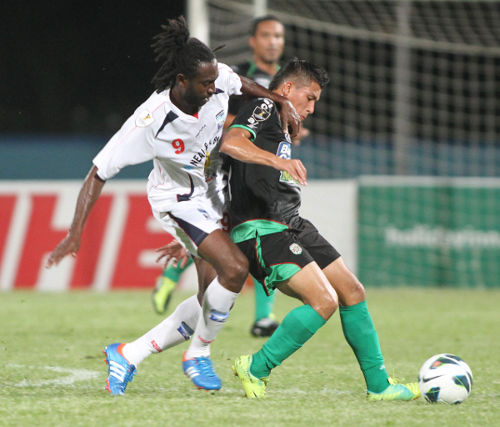Whatever may be the Pro League’s perceived flaws, neither a poor work ethic nor a lack of transparency is ever included among them.
League CEO Dexter Skeene is aided by an enthusiastic young staff knitted together by Corporate Secretary Julia Baptiste—whom he describes as a phenomenal person and asset—and press officer Randy Bando. Critics of the organisation’s marketing need only look at its regularly updated website or Facebook page to form an accurate judgement.
“We did a survey when I took over in 2004 and there was zero percentage of brand recognition,” said Skeene. “We had our own vision and I think we have done a great job of spreading awareness of the League even if some people disagree… Not everyone understands the budget we have.”

Skeene contended that it takes close to $5 million to run the League effectively. Last season, Government offered the body $3 million; there was even less in previous years so that staff members occasionally missed a paycheck.
And yet, the Pro League is still here and fielding proposals from entrepreneurs who, with a view to signing up, are willing to fork out a $400,000 franchise fee plus produce a bank statement that covers two years’ salaries. The final figure can easily reach $2 million.
Heading the queue of some four teams vying for a spot in the 2012-13 edition of the League is Central FC, run by former Trinidad and Tobago 2006 World Cup player Brent Sancho. Since clubs generally seek out sponsors to underwrite their wage bill in the hope of turning a profit by grooming and selling players overseas, Central are likely to be the only serious candidate for League membership in the upcoming season.
“There are several potential investors who are seeing the opportunity to buy in now, put a proper structure in place and eventually benefit from the buying and selling of players,” said Skeene. “There is a lot of work to be done (in the Pro League) but the structure is there and they are becoming more confident that the League will survive.
“They are seeing the talent and the possibility of a return on their investment in a few years’ time.”
But although the League is scheduled to kick off in early September, the Pro League Board, comprising a representative of each of the eight clubs plus Chairman Larry Romany and CEO Skeene, are still to decide the identity of next season’s participants; the delay has created a very volatile situation, with clubs entering the pre-season in a state of limbo.
Skeene feels the country’s best footballing interests are served by an eight-team League so, if San Juan Jabloteh does secure a new sponsor, that would place a huge question mark over Central FC’s participation.

“I don’t think there is a large enough pool of players to have 14 or 15 teams without watering down the quality of the League,” Skeene said. “We had 11 teams at one point and we didn’t qualify for the CONCACAF Club Tournament whereas we have eight now and have two teams (DirecTV W Connection and Neal & Massy Caledonia AIA) in the competition.
“We had eight teams too when Jabloteh beat (MLS team) Chicago Fire. I feel eight is ideal but the Board will decide.”
Central FC, which last week named former Arsenal captain and ex-Chelsea assistant manager and Hearts boss Graham Rix as coach, would be none too pleased if at this late stage the response to their application proves to be negative. Neither would such news get a rise out of their trialists, who include former Jabloteh captain Marvin Oliver and tricky ex-Joe Public winger Hayden Tinto.
Unlike new applicants such as Central FC, returning Pro League teams like Jabloteh need only find $130,000 to keep their place.
“The Pro League is a limited liability company and each club has a share,” Skeene explained. “So the new clubs have to bring a certain share to the table to make up for the monies already invested by the teams that are in it.
“Yes, you want new clubs to come in but if a team just spends a season or two and then pulls out again, it affects the credibility of the competition to an extent.”
Skeene explained that, to further safeguard its brand, the League is considering implementing a “fit and proper test”—as exists in the English game—for club owners. He did not explain, however, how they could make this work in a country where very serious questions about transparency and accountability by the governing body have repeatedly been raised in the Trinidad and Tobago High Court.
Pressed to describe the nature of the Pro League’s relationship with the Trinidad and Tobago Football Federation (TTFF), Skeene opted for the adjective “amicable” although he suggested that the top clubs are not happy with the say they have – or don’t have! – in the running of the country’s football.

According to the TTFF’s Constitution, a zonal body can have as many as six votes while the entire Pro League is on an equal footing with the Trinidad and Tobago Primary Schools’ League, each having a single vote. Skeene’s view is that the Pro League’s status merits representation on the TTFF Executive.
“As the top league in the country that provides 99 percent of players on the national team,” he said, “we feel we need greater representation and to be able to contribute in a more meaningful way.”
Skeene is adamant that Trinidad and Tobago’s historic World Cup qualification in 2006 was “mishandled” and that the blacklisting of the “Soca Warriors” lowered the standard of the local game.
“When the senior players come back and play alongside the younger Pro League players, you have a transfer of knowledge and skills,” said Skeene. “But when that stopped, the Pro League players had to learn the hard way and that affected their education as players.”
Although there are success stories such as W Connection and Caledonia AIA, Skeene noted, that of late the learning curve for the Pro League clubs has been steep.
Caledonia, in particular, have enjoyed unprecedented success since replacing their loose structural arrangements with a more professional administrative set-up.
“This is a time of transition and a shift in the thinking of club owners,” Skeene commented. “In previous times, there was more help from the Government and you didn’t have to focus on the economic side of the game to survive. So a lot of clubs were one-man shows with passionate football people who only cared about what happened on the field.
“But they have found out that you have to pay more attention to the balance sheet. Now, it is clubs who’ve broadened their management style that are setting the pace and it is people with business and marketing acumen who are trying to come in.”
Skeene pointed out that the Pro League continues to experiment with television ideas so as to promote the brand with no adverse effects on attendances and he feels that corporate Trinidad and Tobago is becoming more receptive.

Clubs have also got a fillip from the Sport Ministry’s stated intention to refurbish community grounds. Skeene claimed they were promised five grounds before the end of this season but he would happily settle for three. He conceded that the League would have to address potential security issues but it welcomes the opportunity to strengthen ties with communities and thus increase attendances.
Furthest advanced are the plans for a Sangre Grande home for North East Stars while South-based Connection and Morvant-based Caledonia hope to get access to venues at Gilbert Park and on the Lady Young Road respectively.
Wired868 requested further details on the progress of these plans from SPORTT Company PR Officer Adrian Raymond but the week’s notice proved inadequate for him to provide it by press time.
Skeene, however, remains optimistic that Government will keep its word. He insists that the new initiatives to introduce all-inclusive sections and family days at Pro League games will make a measurable difference.
“I think this season is going to be,” he said, “really exciting.”
This is not the adjective that generally comes to mind when mention is made of the Pro League. Come season 2012-13, Skeene assures, we are in for a change.
Editor’s Note: Read the first of this two-part Pro League series here.
 Wired868 Wired868 for smart sport news and opinion
Wired868 Wired868 for smart sport news and opinion









Very nice article which allows people to understand more about the decisions made by the Pro League. It’s a travesty that the Pro League have such little weight with TTFF. Although there must be equity between the concerns of amateur and professional football, with respect, the Pro League should have a greater say than the Primary Schools League.
It is worrying to note that Mr Skeene is in favour of an 8 team league. I can certainly attest to the fact that Central F.C. could field two Pro League teams with the 36-40 players currently training with them. In my opinion, the players are there, it’s the lack of quality coaches that would weaken a 10 or 12 team league.